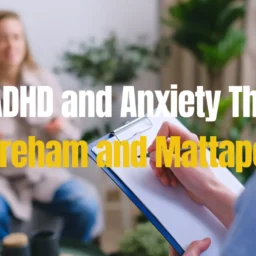
Anxiety is a mental health issue that impacts people everywhere. It affects individuals of all ages, genders, and backgrounds. In areas like Dartmouth, New Bedford, Wareham, and surrounding towns, anxiety disorders are on the rise. Many people are now seeking various treatment options for relief.
Recognizing anxiety symptoms early is important. Understanding how therapy can help is also key for residents in these communities. Common Anxiety Signs about treatment options and how therapy helps people in Dartmouth, New Bedford, Wareham, Freetown, Westport, Acushnet, Fairhaven, Mattapoisett, Marion, and Rochester.
Understanding Anxiety Symptoms
In Dartmouth, as well as in surrounding areas like New Bedford and Acushnet, anxiety is not just a temporary feeling of unease; it can significantly impact daily life. The most common anxiety symptoms include:
- Persistent worry or fear about everyday situations
- Restlessness or feeling “on edge”
- Difficulty concentrating or mind going blank
- Physical symptoms such as dizziness, shortness of breath, and a racing heart
- Muscle tension and headaches
- Irritability or excessive fatigue
These signs can make it challenging for people to function normally in work, school, or social settings, often leading to avoidance behaviors and isolation. Recognizing these signs early can prevent the escalation of anxiety into more severe disorders.
Physical and Emotional Effects of Anxiety Symptoms in Dartmouth
Anxiety does not only affect the mind but also has significant physical and emotional consequences. In cities like New Bedford, Wareham, and Fairhaven, where people juggle family, work, and other commitments, the physical toll of anxiety can be severe, leading to:
- Muscle tension and chronic pain
- Sleep disturbances, such as insomnia or restless sleep
- Digestive issues like nausea or diarrhea
- Fatigue and exhaustion despite adequate rest
Emotionally, anxiety can lead to feelings of helplessness, overwhelming fear, and a persistent sense of dread. Individuals may feel like they are unable to escape these feelings, which can worsen over time if left untreated. Anxiety can affect social relationships. People might pull away or avoid places that make them anxious. This can lower their quality of life.
Effective Anxiety Disorder Treatment Approaches
Dartmouth residents, like those in many other parts of Massachusetts, have access to a range of treatment options for managing anxiety. These treatments can include:
- Medication: Anti-anxiety medications, such as benzodiazepines or SSRIs, to reduce immediate symptoms
- Therapy: Cognitive Behavioral Therapy (CBT), mindfulness-based therapy, or exposure therapy for long-term relief
These treatments can be used separately or in combination to achieve the best results. Medication can provide quick relief. It helps fix chemical imbalances in the brain that cause anxiety. This support allows people to manage their symptoms better. However, therapy is often necessary for long-term relief, as it tackles the root causes of anxiety and teaches individuals how to manage their emotions and reactions.
How Anxiety Medication and Therapy Work Together
In Westport, Freetown, and Mattapoisett, residents may deal with stressors. These include work pressures and personal challenges that can lead to anxiety. For some, medication may be necessary to stabilize symptoms in the short term, especially during times of heightened stress. However, medication is often most effective when combined with therapeutic interventions, including:
- Cognitive Behavioral Therapy (CBT): Helps to reframe irrational thoughts that contribute to anxiety.
- Exposure Therapy: Gradually confronts fears in a controlled setting to reduce avoidance behavior.
- Mindfulness Therapy: Focuses on present-moment awareness to reduce the impact of anxious thoughts.
This dual approach—combining medication with therapy—has been shown to be highly effective in treating anxiety disorders.
Therapists for Anxiety Relief
When seeking therapy for anxiety, it is essential to find a therapist who is experienced and well-equipped to address anxiety disorders. In Dartmouth and surrounding towns like New Bedford and Acushnet, there are many qualified professionals who specialize in treating anxiety. Consider these steps when choosing a therapist:
- Research: Look for a licensed therapist with expertise in treating anxiety disorders.
- Consultations: Schedule a consultation to determine if the therapist’s approach fits your needs.
- Comfort: Ensure that you feel comfortable with the therapist’s style and personality.
With the support of a skilled therapist, individuals in these areas can gain insights into their anxiety and begin learning coping strategies. Many therapists in the region also offer telehealth services, making access to care more convenient for residents of rural areas like Marion and Wareham.
What to Expect from Therapy with a Specialist
Residents of Fairhaven, Mattapoisett, and Rochester seeking therapy for anxiety can expect a tailored approach to treatment. A therapist specializing in anxiety will provide:
- Personalized Treatment Plans: Focused on addressing unique triggers and patterns.
- Relaxation Techniques: Such as deep breathing, progressive muscle relaxation, and grounding exercises.
- Cognitive Restructuring: Helping individuals challenge and change irrational thought patterns.
Therapists will use various techniques to meet each person’s needs. They might include mindfulness or exposure therapy. This way, they can provide the best treatment for lasting relief.
The Role of Anxiety Therapy in Promoting Mental Wellness
One of the most effective therapies for anxiety is Cognitive Behavioral Therapy (CBT). CBT has been shown to help individuals identify and challenge irrational thought patterns that contribute to anxiety. Through CBT, individuals learn:
- How to Recognize and Change Negative Thought Patterns: Addressing distorted thinking that fuels anxiety.
- Behavioral Activation: Encouraging positive actions that promote well-being and reduce anxiety.
- Coping Mechanisms: Building skills to manage stress and anxiety in real-life situations.
In Dartmouth and Wareham, CBT is widely available and is often the first-line treatment for anxiety. This type of therapy teaches individuals to replace negative, anxiety-producing thoughts with more realistic and balanced ones. CBT works well for people with generalized anxiety disorder (GAD), panic attacks, social anxiety, and phobias.
Other Therapy Modalities for Managing Anxiety
In addition to CBT, other therapeutic modalities can also be helpful for managing anxiety. For example, Dialectical Behavior Therapy (DBT) is a form of therapy that emphasizes emotional regulation and mindfulness. DBT can be particularly helpful for individuals who struggle with intense emotions or who have experienced trauma. In Westport, Acushnet, and Marion, therapists may offer:
- DBT: Emotional regulation and distress tolerance for those with high emotional sensitivity.
- ACT (Acceptance and Commitment Therapy) teaches people to accept uncomfortable feelings rather than avoid them.
Another effective therapy is Acceptance and Commitment Therapy (ACT), which focuses on mindfulness and acceptance. ACT helps people accept their anxious thoughts and feelings without judging them. It encourages living in line with personal values instead of letting anxiety take control. ACT helps individuals build psychological flexibility, which is key to managing anxiety over the long term.
Mental Health Therapy as a Lifelong Support for Anxiety
While therapy is often thought of as a short-term solution, the long-term benefits of consistent mental health therapy for anxiety cannot be overstated. For individuals in towns like Rochester and New Bedford, regular therapy sessions provide:
- Ongoing Support: Helps individuals manage anxiety and prevent relapse.
- Emotional Resilience: Strengthening coping mechanisms for future challenges.
- Improved Self-Awareness: Understanding the root causes of anxiety and how to manage them.
With time, people gain better coping skills. They also learn healthier ways to think and understand their anxiety triggers more deeply. Regular therapy sessions help people build resilience to anxiety. This can lessen its impact on daily life.
How Therapy Supports Mental Health Beyond Anxiety in Marion and Freetown
Therapy not only addresses anxiety but can also have a profound impact on other areas of mental health. In Marion and Freetown, individuals who struggle with anxiety often face co-occurring mental health conditions, such as:
- Depression: Feelings of sadness and hopelessness that can co-occur with anxiety.
- Low Self-Esteem: Negative self-image exacerbated by anxiety.
- Relationship Struggles: Difficulty in maintaining healthy social connections.
Therapy can help address these concerns, providing individuals with a holistic approach to mental well-being.
Local Resources for Anxiety Relief in Dartmouth and Nearby Areas
Residents of Dartmouth and nearby towns have access to a variety of local resources for managing anxiety. Local health centers in Dartmouth, New Bedford, and other areas offer:
- Therapy Services: Both individual and group therapy options.
- Workshops: Focused on coping skills, relaxation techniques, and stress management.
- Support Groups: For individuals dealing with anxiety, depression, and other mental health challenges.
If you want personalized care, try private practice therapists in Fairhaven, Mattapoisett, and Marion. They offer one-on-one counseling and specialized treatment for anxiety. Many of these therapists offer flexible scheduling and telehealth services, making it easier for individuals to access care, even in rural areas.
Conclusion
Anxiety is a complex mental health issue affecting many people in Dartmouth and nearby areas, like New Bedford, Wareham, and Fairhaven. Recognizing anxiety symptoms and knowing where to find help is vital for managing and overcoming this condition. Therapy, especially Cognitive Behavioral Therapy (CBT), provides effective tools to reduce anxiety and boost mental health.
By choosing the right therapist and using local resources, individuals can take meaningful steps to manage their anxiety and improve their quality of life. Therapy does more than ease symptoms. It helps people understand themselves, build resilience, and reach lasting mental wellness.
If you or someone you know is struggling with anxiety, reaching out to a therapist in your local community is an essential step toward healing and finding lasting relief.



